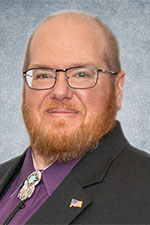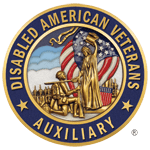National Commander Commentary
DAV Auxiliary > National Commander Commentary

Chris Easley, Auxiliary National Commander
My year as commander: A song of resilience and unwavering unity
One year may seem like a small measure of time, but in the life of a community, it can reshape hearts, deepen connections and define purpose. A single year holds the power to honor the past, influence the present and lay groundwork for the future.
My year as Auxiliary commander is ending. The best way I can describe the past year is that it’s been a song of resilience, played through both highs and lows. Looking back, what resonates most deeply is the sheer strength of our DAV and Auxiliary family. An unbreakable bond and a commitment to stand shoulder-to-shoulder bind us. That is the heart of who we are.
There are many instances from this past year that stick out in my mind. However, placing that wreath at the Tomb of the Unknown Soldier was something special—a top moment in my life, no doubt. It hits you hard, standing there, thinking about all the folks who gave everything.
It was tough, though, because I missed my dad. We’d talked about him being there with me if I ever became commander. He died before that happened. But standing at the tomb, I felt him. While I was there, taking part in a poignant symbol of American sacrifice and remembrance, he was with me, making sure everything went right.
I am profoundly grateful to Brian and Ann Wilner. Their steadfast support has been an unshakable foundation, not just on that memorable day but through every step of this Auxiliary journey. They are a shining example of true compassion in action, and my appreciation for them knows no bounds. Their dedication beautifully illustrates that our mission is, at its core, deeply human. It’s about making a tangible difference in the lives of real veterans and their families, moving beyond theoretical concepts to create genuine impact.
Experiences like the one I had with the Wilners serve as powerful reminders of the human element in our work. It’s about more than abstract needs; it’s about real people, like the veterans and their families we strive to serve through the Auxiliary.
The Auxiliary plays a vital role in championing the needs of our nation’s heroes and their families by informing both policymakers and the wider public of disabled veterans’ needs. Through our unified voice and unwavering dedication to service, we will continue to secure the benefits veterans have earned.
I hope you will help end my year with a renewed commitment to personal connection, reaching out to those who may need a listening ear or a helping hand. And let’s welcome new members with open arms, sharing the camaraderie and purpose that make our family so special. Together, we can ensure our legacy of care and support continues to flourish.
If you want to find out more about the Auxiliary National Commander, you can find his biography here.

